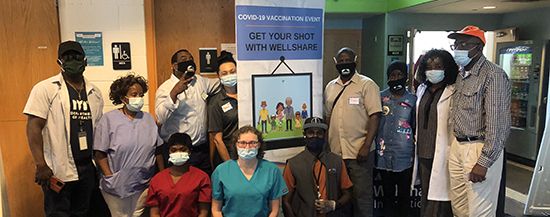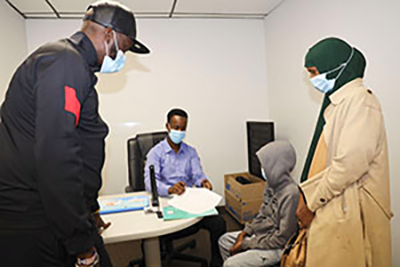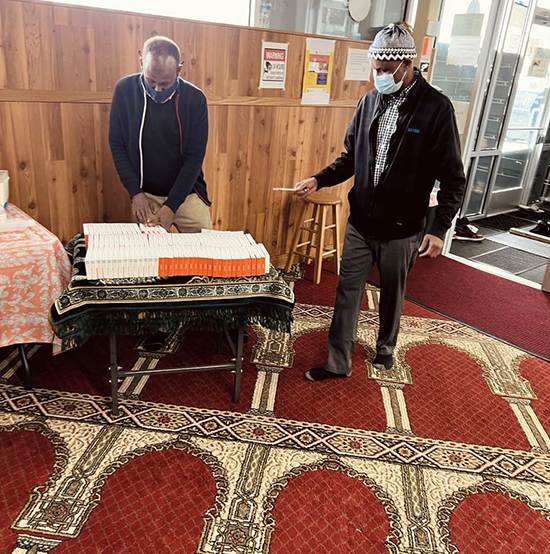Stories: COVID-19
- Stories Home
- New Model of Community Partnership
- Guidance for Hmong Funerals
- Community Outreach for Testing
- Community Testing Partnership
- LGBTQ Community Liaisons
- Tradition and Breastfeeding
- People with Disabilities
- Art and the American Indian Community
- Black Nurses Rock
- Native American Community Clinic
- COVID-19 Testing in Watonwan County
- Community Engagement and Art
- Latinx Community Liaison Team
- Nobles County Research Study
- Public Housing Vaccine Collaboration
- Phyllis Wheatly Community Center
- Community Care Clinics of Minnesota–Odam Medical
- Refugee Resettlement Agencies
- Reaching out to Greater Minnesota
- Community at the Heart of COVID-19 Response
- SEWA-AIFW (Asian Indian Family Wellness)
- Partnering with Faith Communities
- Faith Community Nurse Network
- Celebrating Ramadan Safely
- The Road to Equity
- Celebrating Pride during COVID-19
- Masking Up with the Disability Community
- Mirror Image: The value of lived experience
- Olympic Achievement
- Project Resonance
- The Power of Community Health Care Providers
- Embedding Cultural Communications
- Kick COVID
- Co-creating Messaging
- Connecting Communities through Trusted Messengers
- Partnership in Serving People with Disabilities
- Leveraging the Strength of Community
COVID-19
- COVID-19 Home
- Situation Update
- About COVID-19
- Testing
- Vaccine
- Protect Yourself & Others
- Medications
- Materials & Resources
- Stories of Community Outreach & Partnership
Related Topics
Contact Info
COVID-19 Stories
The Power of Community Health Care Providers
To help address health equity issues arising from COVID-19, the Minnesota Department of Health (MDH) started the COVID-19 Community Coordinator program and partnered with community-based health care providers. These local community-based organizations and health clinics focus on serving our state’s diverse communities that are deeply affected by the pandemic. Clinics like Crown Medical Center, Gargar Clinic, and Briva Health support their local communities by providing health services in a culturally responsive way. This story highlights how these clinics provided unique, adaptive services to serve African immigrant communities in Minnesota.

COVID-19 response at community clinics
Crown Medical Center’s two locations in Minneapolis and Brooklyn Park provide a range of services including COVID-19 testing, vaccinations, mental health screening, opioid addiction prevention, and other support programs in surrounding underserved communities. “The clinics are centered in an area where there is a high need for [health care],” says Dr. Chike Onyekaba, program coordinator at Crown Medical Center. Crown Medical’s initial focus during the pandemic was to decrease fears around COVID-19 and encourage social distancing to avoid infection. As a reliable source for the community, they promoted test kits when they became available as well as provided COVID-19 testing with the kits.
Dr. Joyce Onyekaba, medical director at Crown Medical expressed how the language barrier can be a challenge for many clients. In response to this issue of not being able to speak the language, Crown Medical hosted vaccination events with interpreters and community leaders to promote the vaccines and help answer questions about any misleading information in the media. “It has been a rewarding experience for us,” shared Dr. Onyekaba.
Briva Health is another community clinic who partnered with MDH in the COVID-19 response as a COVID-19 Community Coordinator contractor. Briva is committed to providing accessible health care for hard-to-reach communities. In 2021, they hosted a campaign that particularly aimed to help the Somali community. “We realized quickly that a lot of folks really were not able to access the online system to be able to sign up for the vaccine when it first came out,” said Hodan Guled, CEO of Briva Health. Briva got patients signed up for their COVID-19 vaccine through established connections with the community. They also helped connect people to other resources, such as food stamps, rent help, and health insurance through MNsure. Through their efforts with MDH, they provided over 4,500 vaccinations from April 2021 to June 2022.
Guled shared that Briva aimed to answer the question, “how can we create something that works for our Somali community?” and the answer was to have a clinic that was culturally tailored to the community. “It would be more culturally responsive if we were to create a clinic with providers that look like the people that were using the clinic,” says Guled. Briva launched their first vaccine event with six nurses and two doctors that were Somali in April 2021. Within six hours, they were able to vaccinate more than 430 people. Guled attributes much of their success to the fact that their model was intentionally designed to serve the Somali community with Somali clinicians. “It was a safe space for them…so they trust who we are, the work that we’ve done with them through health care and connecting them to the resources that they need.”
It’s not always easy
Vaccine hesitancy was a prominent obstacle the clinics faced. Dr. Joyce Onyekaba shared that she addresses this by listening to what the patient is most concerned about and then educating them on their concerns. Dr. Chike Onyekaba mentioned how much of the vaccine hesitancy stems from historical trauma such as the Tuskegee experiment. He shared a conversation he had with a patient that helped reassure them. “I'm a black person like you who has gotten vaccinated… It's good to protect yourself. If I wasn't vaccinated, I wouldn't ask you to get vaccinated."
Another barrier has been clearing up misinformation or addressing fears around the vaccine. To address this issue, Briva Health hosted a community forum with trusted figures such as doctors and Imams from the local mosques. Briva collaborated with community leaders to help explain the health information from a perspective of religion, such as, “The Quran says this is what Allah says we should be doing when there is a medical emergency,” Hodan showcased as an example.
Another challenge has been making sure community members came back to the clinic to get their second dose or booster doses after their initial dose. To help with follow-up, Briva installed a system to remind patients about their upcoming appointments.
 Dr. Esse from Gargar Clinic, which focuses on providing high quality and culturally responsive health services that primarily serve African communities, mentioned that in their clinic, they saw hesitancy towards the vaccine due to patients’ young age. They did not see a need for it because they thought symptoms were mild, so patients were more reluctant to get vaccinated. Patients also shared concerns with the side effects of the vaccines, like muscle aches and soreness that contributed to wariness of getting their second doses.
Dr. Esse from Gargar Clinic, which focuses on providing high quality and culturally responsive health services that primarily serve African communities, mentioned that in their clinic, they saw hesitancy towards the vaccine due to patients’ young age. They did not see a need for it because they thought symptoms were mild, so patients were more reluctant to get vaccinated. Patients also shared concerns with the side effects of the vaccines, like muscle aches and soreness that contributed to wariness of getting their second doses.
Next steps in continuing to protect the community
While there continue to be inequities in the COVID-19 pandemic, MDH’s ability to partner with community-based organizations, health clinics, and local public health to help those communities most affected has made a significant impact. A critical element has been supporting partners to design programs and services specifically around the communities they serve and their unique needs. Working together, MDH and its partners aim to continue to make sure that the African immigrant community has access to the culturally tailored COVID-19 resources they need.